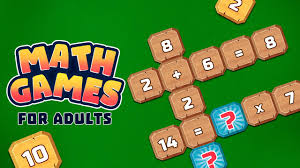Mathematics often gets a reputation for Math Games being dry and challenging, but it doesn’t have to be! Math games provide a playful and engaging way to strengthen math skills, enhance problem-solving abilities, and make learning fun for students of all ages. Here’s why math games are valuable and some examples to get you started.
The Benefits of Math Games
- Enhanced Engagement: Traditional math drills and worksheets can sometimes feel monotonous. Math games inject an element of fun and competition, which can make students more enthusiastic about practicing their math skills.
- Improved Understanding: Games often present math concepts in a hands-on, visual way, helping students grasp abstract concepts through concrete examples. This interactive approach can deepen understanding and retention.
- Development of Critical Thinking: Many math games require strategic thinking, problem-solving, and decision-making. These skills are crucial for math proficiency and can also benefit other areas of learning and daily life.
- Encouragement of Social Interaction: Math games can be played in groups, encouraging collaboration and communication among peers. This social aspect can make learning more enjoyable and less isolating.
- Customization and Adaptability: Math games can be tailored to different skill levels, allowing students to practice at their own pace and focus on areas where they need improvement.
Popular Math Games
1. Math Bingo
Math Bingo combines the classic game of bingo with math problems. Instead of calling out numbers, the caller presents math questions. Players solve the problems and mark their answers on their bingo cards. This game can be adapted for various math topics and difficulty levels.
2. Math Jeopardy
Inspired by the popular TV game show, Math Jeopardy features categories related to different math concepts (e.g., addition, subtraction, multiplication, fractions). Players select questions from various categories and earn points for correct answers. This game is great for review sessions and team play.
3. Prodigy Math
Prodigy Math is an online game that turns math practice into an adventure. Students create characters and embark on quests, solving math problems to advance in the game. It offers personalized learning paths and is suitable for various grade levels.
4. Math Puzzles and Riddles
Math puzzles and riddles challenge students to use their math skills in creative ways. Examples include logic puzzles, Sudoku, and math-based escape rooms. These activities promote critical thinking and problem-solving.
5. Board Games with a Math Twist
Many board games can be adapted to include math elements. For instance, Monopoly can incorporate math practice by having players solve math problems to earn or pay money. Other board games specifically designed for math include “Sum Swamp” and “Math Sharks.”
6. Online Math Platforms
Websites like Khan Academy and Cool Math Games offer interactive math activities and games. These platforms provide a wide range of math topics and skill levels, allowing students to practice and learn at their own pace.
Implementing Math Games in the Classroom
1. Integration into Curriculum: Teachers can integrate math games into their lesson plans to reinforce concepts and provide varied practice opportunities. Games can be used as warm-ups, practice activities, or review sessions.
2. Game Stations: Setting up game stations in the classroom allows students to rotate through different math games, providing a diverse range of activities and keeping students engaged.
3. Family Involvement: Encourage students to play math games at home with their families. This can reinforce classroom learning and make math a part of everyday life.
4. Digital and Physical Options: Combine digital games with traditional board games and card games to cater to different learning preferences and settings.
Conclusion
Math games are a powerful tool for making math learning enjoyable and effective. By incorporating games into educational activities, students can develop their math skills in a fun and interactive way. Whether in the classroom or at home, math games provide an excellent opportunity for students to build confidence, improve their problem-solving abilities, and foster a positive attitude towards mathematics. So next time you’re looking to enhance your math practice, consider adding a game or two to your routine—you might just find learning math to be more enjoyable than ever!

